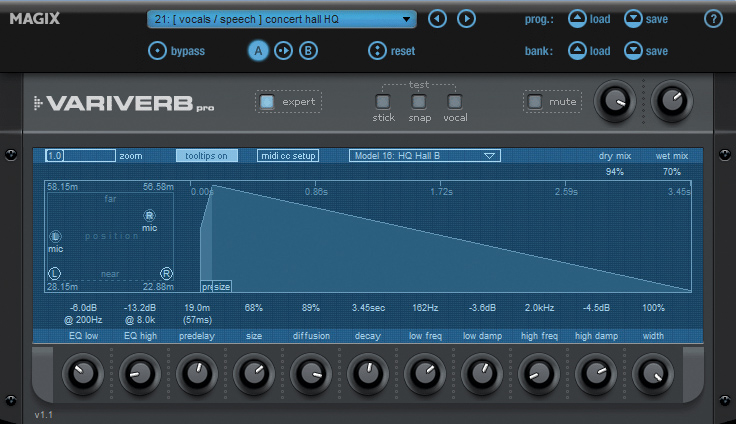MusicRadar Verdict
The algorithmic approach is clearly far from dead, and VariVerb Pro should be considered by anyone looking for a high-quality, flexible reverb plug-in.
Pros
- +
Sounds fantastic. Unintimidating, straightforward GUI. ‘Test’ samples. 16 different models. Good value. Expert mode allows well-conceived tuning.
Cons
- -
Can’t reproduce real rooms à la convolution.
MusicRadar's got your back
Nowadays, impulse response-based convolution is all the rage when it comes to software reverberation. Despite that, Magix have decided that this is the perfect time to ‘unbundle´ the traditional algorithm-based VariVerb Pro reverb and unleash it on the world.
Like the plug-ins in their AM|Suite and VE|Suite packs, VariVerb Pro was previously only found in their Sequoia and Samplitude DAWs, but is now sold separately in Windows VST format.
You might wonder, though, why anyone would even consider going back to old-fashioned algorithmic methods when you can use convolution to bless your mixes with reverberations sampled from famous venues and classic hardware. However, impulse responses (IR) fail to recreate the sounds of certain high-end digital reverbs (like the famous Lexicon units) that employ modulation and non-linear processing. VariVerb Pro makes use of these techniques, and Magix contend that, compared to convolution, its dynamic, interactive response is, in fact, more in line with realistic reverberation.
Models
VariVerb Pro features 16 different reverb models (ie, algorithms), including Room and Hall models; Retro models in the style of 80s/90s digital reverb; the usual obstacle course of Plate, Spring and NonLin (gated and reversed) models; and the definitive HQ Room A/B and HQ Hall A/B mega-reverbs. All are highly usable and sound great, with the HQ models being closest to the real thing and touted by Magix as giving “a plastic, tangible room impression”. Unsurprisingly, they´re the most CPU-intensive too, not to mention the most customisable.
The GUI is clear and features two distinct modes: the default Easy mode, where you get just the Size, Decay and High Damping knobs; and Expert, where a click of the relevant tab reveals a host of extra settings allowing you to fine-tune to your heart´s content. In the HQ models, you can even dial in specific room sizes and position the sound sources and listening positions using a graphical room display.
Presets
Want all the hottest music and gear news, reviews, deals, features and more, direct to your inbox? Sign up here.
Most usefully, the main drop-down menu reveals a set of 51 ready-to-go presets, split into sections by suggested application. These can be quickly put into action when utilising VariVerb Pro as an insert effect, as they come ready-tweaked, have wet/dry ratios already established, and sound absolutely great. Conversely, presets featuring each reverb model at its ‘default´ settings, with the mix set to 100% wet for aux configurations, are included for those wanting to start from scratch. You can control parameters via MIDI CC, too.
VariVerb Pro features everything we´d expect and is clear, expressive and natural in its sound. The HQ models sound almost hyper-realistic and are the icing on the cake - shut your eyes and you can just about picture the space they emulate. Anyone in knots over convolution should absolutely give this a try.
MusicRadar is the number 1 website for music makers of all kinds, be they guitarists, drummers, keyboard players, djs or producers...
GEAR: We help musicians find the best gear with top-ranking gear round-ups and high- quality, authoritative reviews by a wide team of highly experienced experts.
TIPS: We also provide tuition, from bite-sized tips to advanced work-outs and guidance from recognised musicians and stars.
STARS: We talk to musicians and stars about their creative processes, and the nuts and bolts of their gear and technique. We give fans an insight into the actual craft of music making that no other music website can.

